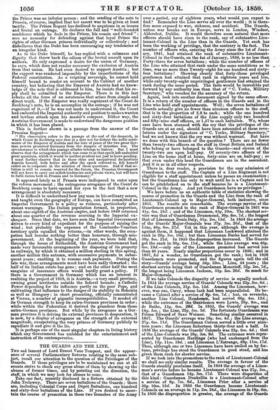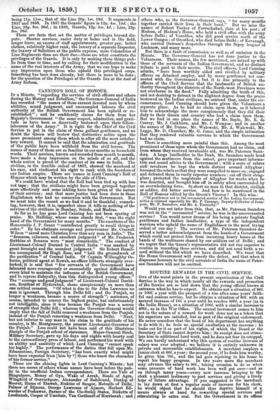THE GUARDS AND THE LINE.
THE sad lament of Lord Ernest Vane Tempest, and the appear- ance of several Parliamentary Returns relating to the same sub- ject, recall our attention to the question of the Privileges of the Guards. If those privileges are to be maintained we can at all events strive to check any gross abuse of them by showing up the abuses of former times, and by pointing out the direction, the staff, in which we may look for abuses to come.
Take one fact, recently disclosed in a Return obtained by Sir John Trelawny. There are seven battalions of the Guards ; there are, including Colonial Corps and Depiit Battalions, one hundred and sixty-four battalions of the Line. If you desired to ascer- tain the course of promotion in these two branches of the Army over a period, say of eighteen years, what would you expect to find ? Remember the Line serves all over the world ; it is there- fore more exposed to war, sickness, and accident. The Guards, unless war breaks out in Europe, serve in London, Windsor, Aldershot, Dublin. It would therefore seem natural that more officers should have risen to the rank, say of substantive Lieu- tenant-Colonel in the Line than in the Guards. Yet such has been the working of privilege, that the contrary is the fact. The number of officers who, entering the Army since the 1st of Janu- ary, 1841, had attained the rank of substantive Lieutenant- Colonel in the Guards, on the let of January, 1859, is no less than Forty-three for seven battalions ; while the number of officers of the Line who attained that rank under the same conditions as to time, was no more than Twenty-eight for one hundred and sixty- four battalions ! Showing clearly that forty-three privileged gentlemen had attained that rank in eighteen years and less, while only twenty-eight unprivileged gentlemen had attained the rank during the same period. The facts would be incredible put forward by any authority less than that of "C. Yorke, Military Secretary,' who vouches for the accuracy of the return. Again, look into another document signed by the same officer. It is a return of the number of officers in the Guards and in the Line who hold staff appointments. Well ; the seven battalions of Guards actually give no fewer than nineteen officers to the staff, that is in the proportion of 2.8 to each ; while the one hundred and sixty-four battalions of the Line supply only two hundred and fifty-nine staff officers, or 1.57 to each battalion. We, whose ears have been stunned with the cry that the privileges of the Guards are at an end, should have been astounded at these reve- lations under the signature of "C. Yorke, Military Secretary," had we not known that the cry was without warrant. But have we done with this branch of the question ? There are no fewer than twenty-two officers on the staff in Great Britain and Ireland who belong or have belonged to the Guards-and eleven of the twenty-two are upon half-pay. Of seventy-two officers of the Line on the home staff at home, forty-nine are on half-pay ; so that even under this head the Guardsmen are in the ascendant. And it is so in all other respects. There is, dear reader, a provision for the easy admission of Guardsmen to the staff. The Captain of a Line Regiment is not eligible for a staff appointment unless he passes an examination ; but the Guardsman has only to wait until he is a Captain and he can be pitchforked on to the staff because he is a Lieutenant- Colonel in the Army. And yet Guardsmen have no privileges! We have before us an authentic table of statistics showing the course of promotion in the Guards and the Line from the rank of Lieutenant-Colonel up to Major-General, both inclusive, since 1851. The results are remarkable. The average service of the Guardsmen promoted to the rank of Major-General in 1851 was
41y. 6m. 24d. ; and of the Linesmen, 45y. 10m. The shortest ser- vice was that of Guardsman Drummond, 39y. 8m. 7d. ; the longest that of Linesman Denis Daly, 51y. 2m. 15d. In 1854 the average
of the Guards' Major-Generals was 37y. 3m. 26d., that of the Line, 40y. 8m. 27d. Yet in this year, although the average is against them, it happened that Linesman Lockwood attained the rank in 29y. 3m. 10d. ; but then Linesman Burke had served for 59y. 8m. 21d. In 1855 the disproportion increased. The Guards got the rank in 30y. Om. 11d., while the Line average was 46y. 6m. 19d.-only one of the Linesmen promoted had served less than 46 years. Nearly similar proportions occur in 1856; and in 1857, for a wonder, no Guardsman got the rank ; but in 1858
Guardsmen were promoted, and the figures again tell the old story-Guards' average being 34y. 10m. •' Line, 44 years ; the shortest service being that of Guardsman Moncrieff, 32y. 2m. 7d., the longest being Linesman Jackson, 53y. 3m. 26d, So much for Major-Generals.
If we take Colonels the disparity of service is equally marked. In 1851 the average service of Guards' Colonels was 22y. 3m. 8d. ; of the Line Colonels, 31y. 2m. 15d. Among the Linesmen, how- ever, was one, Carey, whose luck had been unparalleled. He be- came a Colonel after a service of 9y. 4m. 7d. ; but, en revanche, another Line Colonel, Henderson, had served 60y. 4m. 12d. ;
while the extremes of the Guardsmen were Lewis' 28y. 8m., and de Bathe, 15y. Om. 28d. In 1855, the Guards' average was 14y. Sin.; the Line, 22y. 5m. 3d. The fortunate Guardsman was Prince Edward of Saxe Weimar. Something similar occurred in 1857. The Guards' average was 19y. 4m. 4d.; the Line average, 2'7y. 6m. lid. The Guardsman Curzon served a little over nine- teen years ; the Linesman Robertson thirty-four and a half. In 1858 the average of the Guards' Colonels was 22y. 6m. 4d.; that of the Line-Colonels was 28y. 3m. 9d. The extremes were repre- sented by Guardsman Hardinge (who had exchanged from the Line), 13y. 11m. 19d. ; and Linesman L'Estrange, 49y. 11m. 17d. Thus, although one or two Linesmen have been smiled on by for- tune, privilege has stood the Guardsmen in good stead, and has given them rank for shorter service.
If we look into the promotions to the rank of Lieutenant-Colonel we shall see only similar results. The average in favour of the Guards steadily proclaims itself. In 1854 the average of a Lines- man's service before he became Lieutenant-Colonel was 27y. 3m., that of a Guardsman 14y. 3m. 17d. There were disparities of this kind: Guardsman Dunkellin is a Lieutenant-Colonel after
a service of 8y. 7m. 8d., Linesman Prior after a service of 50y. 10m. 15d. In 1855 the Guardsmen became Lieutenant- Colonels on an average in lly. 2m. 24d., the Linesmen in 18y. 6m. In 1856 the disproportion is greater, the average of the Guards being 11y. 11m., that of the Line 20y. lm. 18d. It augments in 1857 and 1858. In 1857 the Guards' figure is 12y. 4m. 15d.; the Line, 23y. 8m. 26d.; in 1858, Guards, 12y. Sm. 4d. ; Line, 23y. 8m. 26d.
These are facts that set the matter of privileges beyond dis- pute. Shorter services, easier duty at home and in the field, longer leave, an excess of staff appointments, greater pay, better clothes, relatively higher rank, the luxury of a separate Inspector, the luxury of Solicitors at the public expense, more Colonelcies of Line Regiments than are their due—these are what constitute the privileges of the Guards. It is only by making these things pub- lic from time to time, and by calling for their modification in the name of the real interests of the Army, that we can hope to make any impression upon those who uphold this privileged corps. Something has been done already, but there is more to be done ; for the question of the Privileges of the Guards lies at the root of Army Reform.



























 Previous page
Previous page